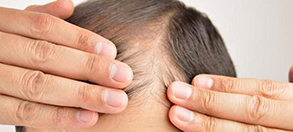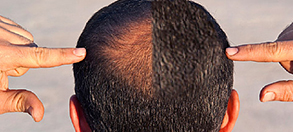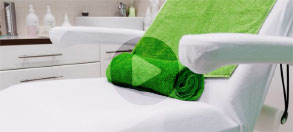
Autologous conditioned plasma (ACP) for hair loss is an excellent supplemental treatment and a promising primary treatment to help replenish your head with a full head of hair.
Contents
- 1 Use Your Body’s Regenerative Power to Treat Hair Loss
- 2 About ACP for Hair Loss in Houston
- 3 Benefits
- 4 Am I a Good Candidate for ACP for Hair Loss?
- 5 Your Hair Treatment Consultation in Houston, TX
- 6 How to Prepare for ACP Treatments for Hair Loss
- 7 How is ACP for Hair Loss Performed?
- 8 ACP and Follicular Unit Extraction (FUE)
- 9 Is ACP Effective at Regrowing Hair?
- 10 Recovery and Aftercare
- 11 How Much Does ACP Hair Treatment Cost?
- 12 FAQ
- 13 References
Use Your Body’s Regenerative Power to Treat Hair Loss

In the ongoing quest to find the most effective treatment for hair loss, physicians and researchers have experimented with many different options, including ACP (autologous conditioned plasma). In your research, you may come across the option of using ACP injections for hair loss, and you may have found the information inconclusive. Autologous Conditioned Plasma leverages the regenerative power latent in your body’s platelets to activate heightened healing and tissue building in your body. Dr. Jezic can explain the current scientific consensus and highlight the situations where he finds ACP therapy the most beneficial.
Dr. Goran Jezic M.D. is a leading expert on hair loss treatments. With a broad understanding of the medical science and artistry behind hair transplant techniques, he can custom craft a hair treatment solution just for you. If you’re ready to start treating your hair loss, schedule an appointment with Dr. Jezic online or call our Houston office at 713-864-2300. For your convenience, we also offer virtual consultations.
About ACP for Hair Loss in Houston
ACP treatment isn’t often at the top of the list when people are searching for hair restoration techniques. First, you’ll read about topical minoxidil (Rogaine) because it’s available over the counter. If you try that and it fails, you’ll probably talk to your doctor about oral finasteride (Propecia). And if that doesn’t work either, you may begin to look into more surgical options, such as follicular unit extraction (FUE). While we mostly perform ACP therapy in combination with FUE surgery, we also offer stand-alone ACP treatments for hair loss.
What is ACP Treatment?
ACP stands for autologous conditioned plasma. Plasma is one of several components that make up your blood. Red blood cells contain hemoglobin, which is a protein that helps transport oxygen taken in via the lungs throughout the body and dispels carbon dioxide as waste, again through the lungs. White blood cells are the basis for your immune response. These cells, made inside your bone marrow, are stored in your lymphatic system and help you fight off infections, viruses, and anything your body deems as foreign.
Platelets are what clot your blood so you stop bleeding. If you get a cut on your finger, the damaged blood vessels send signals to your body that it needs platelets. Upon arrival, the platelets “grow sticky tentacles” so they can adhere to each other and form a barrier over the cut. Then, they send out signals to other platelets to gather at the cut which stimulates the body’s natural regenerative processes.
The final component is plasma. Plasma makes up about 55% of our blood. It performs many functions, such as carrying nutrients, proteins, and hormones to various cells, maintaining blood pressure and volume, and dispelling cell waste. Autologous conditioned plasma is simply plasma with a very high concentration of platelets.
Benefits
- Stimulates blood flow
- Promotes your body’s natural healing
- Extremely beneficial when used in conjunction with FUE
- Can increase terminal hair density
Am I a Good Candidate for ACP for Hair Loss?
ACP may be a good treatment option for you if you’ve already tried oral finasteride and topical minoxidil without seeing any kind of meaningful results. There are some circumstances under which a patient may not be a good fit for ACP, such as:
- Cancer
- Low platelet count (because your own blood fuels the hair restoration process)
- Liver disease
- Sepsis
- Infection
- Metabolic disorders
Therefore, it’s important that you meet with a physician for a complete medical history prior to scheduling ACP treatment (this is something we do during consultations).
Your Hair Treatment Consultation in Houston, TX

We’re proud to be the hair transplant surgeons of choice for pro athletes, actors & celebrities. Dr. Goran Jezic focuses his medical career on hair loss treatments. He has established himself as an expert in this field of medicine and can help you understand the science behind hair loss and hair treatments.
During your consultation, Dr. Jezic will conduct a review of your condition, examine your scalp and go over your expectations and goals. After getting to know you, he can present you with a treatment plan designed to treat your hair loss. Dr. Jezic will discuss all your options and make sure you understand what is and isn’t possible with hair loss treatments. Autologous conditioned plasma is just one technique in his toolkit of hair treatments. He will advise on what will be the most effective treatment in your situation and match you with the treatment(s) designed to produce the most effective results. Connect with Dr. Jezic online and schedule a virtual appointment or call our Houston office at 713-864-2300.
How to Prepare for ACP Treatments for Hair Loss
Dr. Jezic will provide you with a full set of instructions. You should make sure to diligently follow those instructions to ensure the best results.
General Preparation
- Avoid blood-thinners, both medications and supplements – these include aspirin, ibuprofen, fish oil, ginseng, and flax.
- Clean your head and scalp thoroughly.
- Do not use hair dye for at least three days before your treatment.
- Refrain from smoking at least three days before your procedure.
How is ACP for Hair Loss Performed?
ACP is produced by placing about 20 CC of whole blood (taken through a regular blood draw) into a centrifuge that spins the blood at high speed into different layers. Although not noticeable when mixed in our blood, plasma is actually a pale yellow color naturally, so when it separates in the centrifuge, it’s quite easy to see by contrast. There are two plasma layers. The top layer contains platelet-poor plasma and the bottom layer contains autologous conditioned plasma. The platelet-poor plasma is dispersed over the extracted follicles in a dish to nurture them, while the autologous conditioned plasma and buffy coat are injected into the patient in whatever area needs the therapy.
ACP and Follicular Unit Extraction (FUE)
ACP has been proven very effective time and time again in wound healing. Therefore, we almost always use ACP treatments in conjunction with Atera FUE or Neograft FUE for maximum results.
After the hair follicles have been harvested from the donor site, the patient’s own ACP is injected back into the scalp to promote faster healing — something of great interest to most of our patients, as the post-operative healing period can be uncomfortable (though certainly not unbearable).
Is ACP Effective at Regrowing Hair?
The evidence as to whether or not ACP alone is effective at hair restoration is complicated.

Some have hypothesized that the proteins contain multiple types of growth factors, such as platelet-derived growth factor (PDGF), transforming growth factor (TGF), vascular endothelial growth factor (VEGF), insulin-like growth factor (IGF), epidermal growth factor (EGF) and interleukin (IL)-1. It is believed that these growth factors could promote new follicle development and blood vessels (neovascularization).[1]
Of course, if there are new follicles, new hair may grow.
Therefore, ACP treatments in areas of the scalp where the hair is thinning could potentially help the shrinking follicles produce hair more efficiently, in addition to creating some new follicles. Regardless, good blood flow certainly won’t hurt — but exactly how much hair growth can be stimulated requires more research.
A number of studies have shown that ACP treatments for hair loss are promising and could be beneficial, but the evidence is not yet conclusive and requires more clinical research.[2][3][4]
Recovery and Aftercare
Proper care after FUE treatment plays a major role in the success of the procedure. Follow Dr. Jezic’s aftercare instructions, such as spraying the scalp with water and letting it air dry, not washing or brushing your hair for the first week, and refraining from dyeing your hair for the first month. Aftercare ensures the transplant site accepts the relocated follicles while allowing the donor site to heal properly. The faster the healing time, the more satisfied patients are likely to be with their FUE hair transplant results — and ACP treatment is an excellent way to help.
How Much Does ACP Hair Treatment Cost?
At our center, ACP therapy can be added to any hair transplant procedure for $1000. ACP can also be used as a minimally invasive stand-alone treatment for hair loss for $1,500 per treatment or 3 treatments for $3,000.
FAQ
Is ACP for Hair Loss Safe?
ACP treatments for hair loss are perfectly safe. The elements of ACP derive from the patient’s own blood, so there’s no need to run it through a wide battery of testing, as the case would be with donor blood.
Using plasma during medical treatments is relatively common (whether platelet-rich or poor). For example, plasma is used to treat immunodeficiency diseases, injuries, burns, genetic emphysema, and to provide a quick immunity boost (via antibodies) in potentially life-threatening situations.
In the case of hair restoration, the safety concerns are simple. Dr. Jezic always uses sterile needles and syringes, there’s very little risk of infection involved in the procedure.
References
- Stevens, J., & Khetarpal, S. (2018). Autologous Conditioned Plasma for androgenetic alopecia: A review of the literature and proposed treatment protocol. International journal of women’s dermatology, 5(1), 46–51. https://doi.org/10.1016/j.ijwd.2018.08.004
- Gentile, P., Garcovich, S., Bielli, A., Scioli, M. G., Orlandi, A., & Cervelli, V. (2015). The Effect of Platelet-Rich Plasma in Hair Regrowth: A Randomized Placebo-Controlled Trial. Stem cells translational medicine, 4(11), 1317–1323. https://doi.org/10.5966/sctm.2015-0107
- Giordano, S., Romeo, M., di Summa, P., Salval, A., & Lankinen, P. (2018). A Meta-analysis On Evidence Of Platelet-rich Plasma for Androgenetic Alopecia. International journal of trichology, 10(1), 1–10. https://doi.org/10.4103/ijt.ijt_74_16
- Shapiro J, Ho A, Sukhdeo K, Yin L, Lo Sicco K. (2020). Evaluation of autologous conditioned plasma as a treatment for androgenetic alopecia: A randomized controlled trial. Journal of the American Academy of Dermatology. 2020 Jul 9:S0190-9622(20)32170-8. https://doi.org/10.1016/j.jaad.2020.07.006


